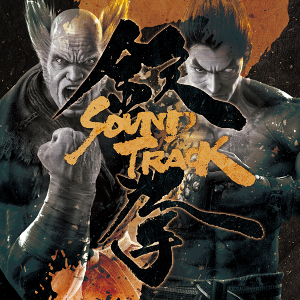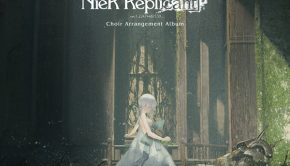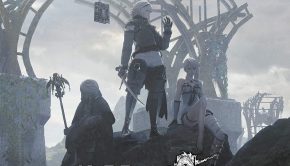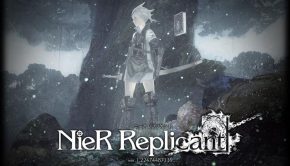Tekken 7 Soundtrack
 |
Album Title: Tekken 7 Soundtrack |
| Record Label: Sweep Record |
|
| Catalog No.: SRIN-1136 |
|
| Release Date: May 21, 2016 |
|
| Purchase: Buy at CDJapan |
Overview
Tekken 7 is the latest mainline game in the popular fighting franchise. Originally released in arcades on March 18th, and to be brought to consoles in early 2017, the soundtrack continues the recent trend of incorporating modern electronic sounds to the franchise. Lead composer, Rio Hamamoto, is joined by a bevy of Tekken veterans, including Keiichi Okabe, sanodg, AJURIKA, and Taku Inoue. In addition, Swedish art metal band, BatAAR contributes a piece to the soundtrack as well. How does the Tekken 7 Soundtrack compare to some of the more recent Tekken soundtracks, like Tekken Tag Tournament 2 and Tekken Revolution?
Body
AJURIKA, who served as lead composer for Tekken Tag Tournament 2, contributes a fair amount of music to this game as well. The opening sequence music, “Heat Haze Shadow,” is a high energy tune with a bit of an industrial sound that helps set the tone for the soundtrack. As the track progresses, some vocal work is incorporated into the track as well. “Dream Chest” is another shorter tune that’s quite upbeat, but at the same time, a bit basic in structure and repetitive. There are some ethereal qualities to the synth that do give it a “dream-like” sound as well. His remaining contributions are all of stage themes. Like Street Fighter V, which released earlier this year, the stage music also has two variations, non-final round and final round music. Compared to Street Fighter V, I think that the final round versions of Tekken 7‘s stage music certainly captures the spirit of the final round, that give it or your all or lose mentality. “Equator Line 1st” is a drum n’ bass tune with an catchy melody and lots of synth manipulation. It really carries the modern Tekken sound quite nicely. The final round version, “Equator Line 2nd,” is a much more intense offer that continues with the drum n’ bass sound. The melodic focus is there, but isn’t as prominent, and the end result is an excellent transformation of the tune. “Empty Your Mind 1st” employs AJURIKA’s most defining style, psytrance, and creates an exquisite tune that really showcases some nice layering and subtle melodic incorporation while maintaining an Asian vibe to the music. “Empty Your Mind 2nd” is a drum n’ bass interpretation that features a more industrial vibe and is much more intense. “A Grain of Sand 1st” is a basic drum n’ bass tune with some Middle Eastern instrumentation thrown into the mix. The melody itself is quite strong and the overall tune fits the desert stage quite nicely. Things intensify with “A Grain of Sand 2nd” doubling down on the Middle Eastern influence in the music while changing from drum n’ bass to a psytrance tune.
Other Tekken veterans play a smaller role. Keiichi Okabe’s two tunes, both for a snowy stage, are equally impressive. “Arctic snowfall 1st” is a dubstep influenced tune with plenty of bass modulation. The melody itself is quite beautiful and features crystalline synths and wonderful layering while “Arctic snowfall 2nd” is more drumstep in style with its uptemp rendition of the tune and the crystalline sound is amplified with the focus including piano as well. sanodg’s two tunes are also quite nice. “The day before the glass matrix 1st” is a great electro tune with an excellent melody that is catchy and an overall tone that borders on edgy and heavy while “The day before the glass matrix 2nd” is much faster in tone, drops the melodic focus, although not completely, and gives off a bit of an industrial vibe as well. If you play as the Swedish character, Lars Alexandersson, on the Twilight Conflict stage, the same stage where sanodg’s music plays, Swedish art metal band BatAAr’s song, “VREDE,” which translates to anger or wrath in Swedish, plays during the final round. This tune definitely fits the heavy metal bill, featuring guttural vocals and heavy rock, but the chorus is certainly a bit clearer and more melodically focused. There are some synth tones added as well, but compared to the rest of the soundtrack,the song itself does feel out of place.
Namco composer Taku Inoue, who served as lead composer for Tekken Revolution, offers four tunes of his own. The character select music, “Fight Night,” has a bit of a rock edgeand has a drum n’ bass influence. There’s a lot of synth modulation in this tune and, although it is fairly memorable, it, like many character select music, can get a bit repetitive. His two stage tunes, “Ruin 65 1st” and “Ruin 65 2nd,” are also some of my favorites on the soundtrack. The former features exotic percussion mixed with glitchy drum n’ bass that works to create a very memorable tune and also showcases the versatility of Inoue’s electronic styles. The latter is more straight forward in terms of a drum n’ bass tempo, but also incorporates a lot of glitchy sounds. The majority of the tune itself is essentially a dubstep drop that has a melody, but given the major focus of the tune to this feature, it might be a bit tiring to some, but it does fit the intensity of the final round quite well. As with many of his Tekken contributions, his credits theme is a vocal titled “The Long Goodbye.” Sung by Darnell Abraham, it features beautiful lyrics and an excellent vocal performance as well. The melody itself is exquisite and the overall vibe has a pop/R&B feel to it. Inoue certainly has a penchant for crafting these beautiful ending themes and this one is no different.
Lastly, lead composer Rio Hamamoto offers up three stage themes of his own. “Dojo 1st” features a gritty electronic sound with vocal samples, reminiscent of his past Tekken contributions. The mix itself sounds a bit muddy, but the overall tune is still strong and features a great melody. “Dojo 2nd” is much clearer in sound, sporting a fast tempo while retaining elements heard in the first round rendition, such as the gritty sound and vocal samples. There is a more prominently featured Japanese stringed instrument that only plays a few notes in terms of range, but adds to the overall atmosphere of the piece. His other two contributions are where he really deviates from past Tekken efforts. “Volcano 1st” is an absolutely stunning piece featuring a beautiful mix of choral samples, electronic synths, and percussion. The melody itself is also wonderful and bright. A much more dramatic affair is “Volcano 2nd,” which takes the choir and makes it a much more prominent feature. Hamamoto also incorporates some rock in the form a deep bass guitar work and some riffs and orchestral tones that really help add a lot of depth to the piece and the harpsichord addition, during the faster tempo sections, while only used as accompaniment, makes for a really interesting addition I was not expecting. The overall feel is quite cinematic at times and the edgier electronic tones really add a nice dark element to the piece. This was definitely a total surprise for me, based off of Hamamoto’s previous Tekken entries. He is also responsible for the final boss music and surprises equally as well. “KAZUMI’s Theme” carries some of the elements featured in the “Volcano” tunes, which makes sense, given they take place on the same field, and features a blend of operatic vocals, choir, strings, and electronic elements that is quite exquisite. The piece itself is very dramatic and I love the classical influence meets modern elements of the piece. The final round theme, “Devil KAZUMI,” opens up with a softer tone, similar to “KAZUMI’s Theme,” but quickly transitions to a choir driven, guitar heavy rendition. The various elements of the piece, from the guitar and choir to the electronc elements, work excellent together and complement one another quite nicely to create an edgy, driven tune that is certainly a highlight of the soundtrack and of Hamamoto’s contributions.
Summary
The Tekken 7 Soundtrack continues with the strengths of the more recent Tekken soundtracks like Tekken Tag Tournament 2 and Tekken Revolution. The overall sound is certainly electronic focused and the incorporation of separate music for final round and non-final round really help bring some freshness to the series. Hamamoto does a good job as sound director and his contributions certainly are strong. There is a lot of music here that is sure to please fans of the series and the variety of the electronic styles only serves as a plus. For fans of the other Tekken soundtracks mentioned, this one is certainly worth getting. If you order from Sweep Record directly, you’ll also get an extra disc containing an hour long mix of Tekken music ranging from Tekken 6 to Tekken 7 and including music from Tekken Tag Tournament 2 and Tekken Revolution. Once the game gets brought to consoles in early 2017, it’ll be interesting to see what new music, if any, is added, similar to the console release of Tekken Tag Tournament 2.
Do you agree with the review and score? Let us know in the comments below!
4
Posted on June 24, 2016 by Don Kotowski. Last modified on June 24, 2016.














